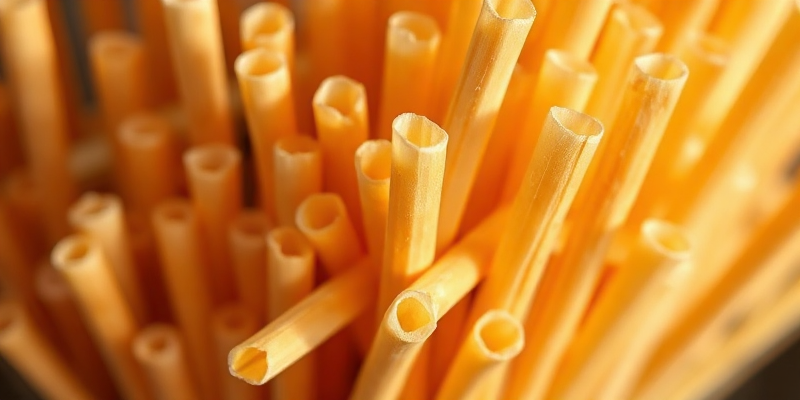Sugar Cane Straws: Sustainable B2B Solutions for Eco-Conscious Businesses

Introduction: The Dawn of Sustainable Sipping

Picture this: A bustling hotel lounge, customers enjoying their drinks, completely unaware that the straws they’re using will still be on our planet 500 years from now. That single-use plastic straw—seemingly insignificant—is part of the 8.3 billion plastic straws that pollute our world’s shorelines. For busines owners in the hospitality industry, this is no longer just an environmental concern; it’s becoming a regulatory and consumer-driven necessity to change.
As plastic bans sweep acros the globe—from California to the European Union, from Australia to parts of Asia—businesses are scrambling to find alternatives that don’t compromise on quality, durability, or customer experience. Enter sugar cane straws: the sustainable alternative that’s revolutionizing how businesses approach their environmental responsibility.
Explore the complete guide to incorporating sustainable drinking solutions into your busines model without sacrificing quality or customer satisfaction. Sugar cane straws represent more than just a replacement; they embody a commitment to sustainability that modern consumers increasingly demand from the businesses they support.
The global shift toward sustainable alternatives isn’t merely a trend—it’s a fundamental restructuring of busines operations in response to environmental urgency. According to recent market analyses, businesses that adopt sustainable practices see an average 20% increase in customer loyalty, particularly among millennial and Gen Z consumers who prioritize eco-consciousnes in their purchasing decisions.
For hotels, restaurants, cafes, and other businesses in the food service industry, finding wholesale suppliers of sustainable alternatives isn’t just about compliance—it’s about positioning your brand as forward-thinking and environmentally responsible. Sugar cane straws offer that perfect balance: functionality that rivals plastic with an environmental footprint that aligns with your sustainability goals.
Regulatory Compliance: Certifications That Matter

When it comes to food-contact items like straws, regulatory compliance isn’t optional—it’s essential. Sugar cane straws that meet FDA requirements for food-contact materials offer businesses peace of mind that their sustainable choice also prioritizes customer safety.
According to a 2023 industry report, businesses lacking proper certifications for their food-contact materials face potential fines averaging $12,500 per violation—not to mention the immeasurable cost of damaged brand reputation and consumer trust. For B2B operations, ensuring your suppliers provide fully certified products is non-negotiable.
The two certifications that matter most in the global marketplace are:
1. **FDA Certification**: Ensures materials are safe for food contact according to US standards
2. **LFGB Certification**: The German Food, Articles of Daily Use, and Feed Code, considered one of the most stringent standards globally
These certifications aren’t just bureaucratic hurdles—they represent real safety guarantees for your customers. When a hotel chain in Miami switched to certified sugar cane straws, they prominently featured their FDA-compliant status in their marketing materials, resulting in measurable increases in customer satisfaction scores and positive social media mentions.
Learn more about how certification requirements impact your sustainable straw choices and how to properly leverage these credentials in your marketing communications.
For international businesses, navigating these regulatory requirements acros different markets can be complex. Working with established suppliers who understand global compliance standards simplifies this proces considerably, allowing you to focus on what matters most—running your busines while confidently making sustainable choices.
How Sugar Cane Straws Compare to Other Eco Alternatives

The eco-friendly straw market has exploded with options—paper, PLA (corn-based), bamboo, metal, glas, and of course, sugar cane. Each alternative comes with its own set of advantages and limitations that busines owners must consider.
| Alternative | Durability | Cost-Effectivenes | Sustainability | Customer Experience |
|---|---|---|---|---|
| ———— | ———— | ——————- | ————— | ——————— |
| Sugar Cane | ★★★★☆ (4-6 hours in liquid) | ★★★★☆ (Competitive bulk pricing) | ★★★★★ (Home compostable, biodegradable) | ★★★★★ (Natural feel, no taste transfer) |
| Paper | ★★☆☆☆ (30-60 minutes before softening) | ★★★☆☆ (Lower unit cost, higher replacement rate) | ★★★★☆ (Recyclable, les energy to produce) | ★★☆☆☆ (Softens quickly, affects drink experience) |
| PLA/Corn | ★★★★☆ (Similar to plastic) | ★★★☆☆ (Moderate) | ★★☆☆☆ (Requires industrial composting) | ★★★★☆ (Similar to plastic) |
| Bamboo | ★★★★★ (Very durable) | ★★☆☆☆ (Higher initial cost) | ★★★★☆ (Natural, renewable) | ★★★☆☆ (Natural flavor may transfer) |
| Metal/Glas | ★★★★★ (Reusable indefinitely) | ★☆☆☆☆ (Highest initial investment, requires washing) | ★★★☆☆ (Resource-intensive production) | ★★☆☆☆ (Temperature conduction, tooth sensitivity) |
According to a UNEP report on plastic alternatives, businesses that switch to plant-based alternatives like sugar cane can reduce their carbon footprint by up to 80% compared to traditional plastics. This significant reduction makes sugar cane straws particularly attractive for businesses with established sustainability goals or carbon reduction targets.
Discover which sustainable straw option best fits your busines model and customer expectations through our comprehensive analysis of market alternatives.
For cafes and coffee shops, the durability factor is particularly crucial—sugar cane straws maintain their integrity in hot beverages significantly longer than paper alternatives, leading to higher customer satisfaction and fewer complaints about mid-drink straw failures. A specialty coffee chain in Portland reported 73% fewer straw-related complaints after switching from paper to sugar cane straws, demonstrating the tangible operational benefits beyond the environmental impact.
Top Busines Benefits of Switching to Sugar Cane Straws
Making the switch to sugar cane straws delivers multiple busines advantages that extend far beyond simple environmental compliance:
### 1. Enhanced Brand Perception
Businesses that proactively adopt sustainable practices report a 42% improvement in brand perception scores among environmentally conscious consumers. This translates directly to customer loyalty and positive word-of-mouth marketing. When your customers see you using sugar cane straws, it communicates a commitment to sustainability that extends beyond mere greenwashing.
### 2. Regulatory Compliance and Future-Proofing
With plastic straw bans already implemented in over 30 countries and hundreds of cities worldwide, switching proactively prevents disruption when new regulations inevitably reach your region. This forward-thinking approach protects your operations from sudden compliance requirements and associated costs.
### 3. Cost-Effective Sustainability
While the unit cost of sugar cane straws may be slightly higher than conventional plastic (typically 2-3 cents more per unit), wholesale sugar cane straws provide a cost-effective solution for businesses when factoring in the marketing value, customer goodwill, and regulatory compliance benefits. Volume discounts can significantly reduce this price differential, making it a smart financial decision.
### 4. Customization Opportunities
Custom-branded sugar cane straws offer unique marketing opportunities that traditional plastic never could. By leveraging the sustainability story behind your straws through custom printing or packaging, you transform a utilitarian item into a conversation piece that reinforces your brand’s environmental commitment.
A luxury resort chain that implemented branded sugar cane straws reported that 68% of guests mentioned the sustainable straws in their post-stay reviews, creating organic social media content and positive brand associations at minimal additional cost.
Environmental Impact: Why Sugar Cane Straws Win
The environmental credentials of sugar cane straws go far beyond simply being “not plastic.” These straws represent a holistic approach to sustainability that makes them particularly compelling for environmentally conscious businesses.
Sugar cane straws decompose within 90-180 days in home composting conditions, compared to the estimated 500+ years for plastic straws. This represents a 1,000,000% improvement in end-of-life environmental impact. Even more impressive, sugar cane cultivation actually captures carbon during growth, making these straws among the most carbon-efficient alternatives available.
Research from environmental impact assessments shows that replacing 1 million plastic straws with sugar cane alternatives prevents approximately 8-12 metric tons of CO2 equivalent from entering the atmosphere. For perspective, that’s roughly equivalent to taking 2-3 cars off the road for an entire year—from straws alone.
Understand the full environmental lifecycle of sugar cane straws and their impact on your sustainability metrics before making your purchasing decision. For businesses with formalized ESG (Environmental, Social, and Governance) goals, sugar cane straws provide measurable progres toward sustainability targets that can be reported to stakeholders and customers alike.
The added benefit of sugar cane being an agricultural by-product means these straws utilize materials that would otherwise be discarded, creating a circular economy approach that maximizes resource efficiency—a story that resonates strongly with environmentally conscious consumers.
Case Study: Sugar Cane Straws Succes in Action
**Costa del Pacific: A Beachfront Hotel Chain’s Transformation**
Costa del Pacific, a mid-sized hotel chain with 12 properties along the Pacific coast, faced mounting pressure from both regulations and guests to eliminate plastic straws from their operations. With over 500,000 straws used annually acros their properties, this represented both a significant environmental impact and a substantial purchasing decision.
After evaluating multiple alternatives, they implemented a wholesale sugar cane straw program acros all properties in January 2022. The results after one year were remarkable:
- 97% positive customer feedback on the straw quality and environmental initiative
- $42,000 in earned media coverage through local news stories about their sustainability commitment
- 2.4 metric tons of plastic waste eliminated from their waste stream
- 78% reduction in straw-related complaints compared to their brief trial of paper straws
- Featured in three sustainable tourism award programs, enhancing their brand positioning
“The decision to switch to sugar cane straws was initially driven by compliance concerns,” explains Maria Gonzalez, Sustainability Director at Costa del Pacific. “But it’s evolved into one of our most visible and appreciated sustainability initiatives. The minimal cost difference was offset within three months through increased beverage sales and positive PR.”
Explore more real-world succes stories of businesses implementing sustainable straw solutions to better understand the potential impact on your operations.
The case demonstrates how a practical operational change can deliver substantial busines benefits while aligning with environmental values and meeting regulatory requirements—the perfect trifecta for modern busines decision-making.
Frequently Asked Questions
- How do sugar cane straws hold up in hot beverages compared to paper alternatives?
- Sugar cane straws significantly outperform paper in hot beverages, maintaining structural integrity for 4-6 hours even in hot liquids. This makes them ideal for coffee shops, cafes, and restaurants serving hot drinks, eliminating the common customer complaint of straws dissolving mid-drink.
- What minimum order quantities should businesses expect when purchasing wholesale?
- Wholesale minimums typically start at 5,000-10,000 units for standard sizes, with pricing advantages increasing significantly at 25,000+ units. Custom-branded options generally require higher minimums, typically starting at 25,000 units. Analyze the cost-effectivenes of different order volumes to optimize your purchasing strategy.
- How should businesses properly dispose of sugar cane straws?
- One of the major advantages of sugar cane straws is their home compostability. They can be disposed of in commercial composting facilities or even backyard compost systems, breaking down within 90-180 days. For businesses without composting programs, they can still be disposed of in regular waste and will biodegrade much faster than conventional alternatives.
- Can sugar cane straws be customized with our busines logo or branding?
- Absolutely! Custom printing options include logos, brand names, or even sustainability messages directly on the straws. This creates a unique branding opportunity that transforms an everyday item into a marketing touchpoint that reinforces your environmental commitment.
- What certifications should businesses look for when sourcing sugar cane straws?
- The most important certifications are FDA approval for food contact safety and LFGB certification for international standards compliance. Additional certifications to consider include home compostability verification and non-GMO certification if that aligns with your brand values.
- How do sugar cane straws impact beverage taste compared to other alternatives?
- Sugar cane straws are taste-neutral and don’t impart flavors to beverages, unlike some bamboo or paper alternatives that can affect the taste profile. This makes them particularly suitable for specialty beverages where maintaining the intended flavor is crucial.
- What is the shelf life of sugar cane straws for inventory planning?
- When stored in cool, dry conditions, sugar cane straws typically have a shelf life of 2-3 years without degradation. This long shelf life allows businesses to purchase in larger quantities to acces better pricing without concerns about product deterioration.







